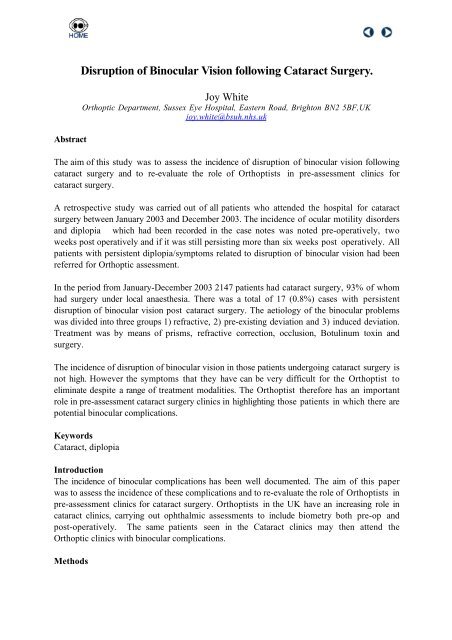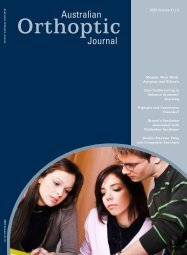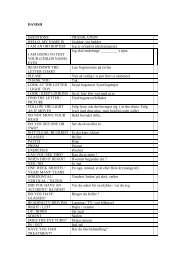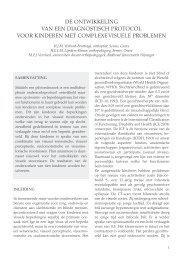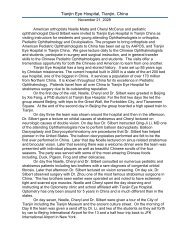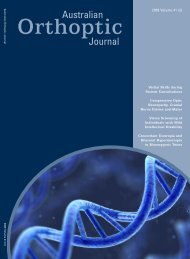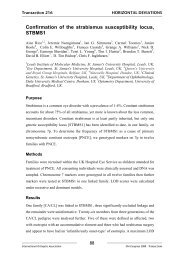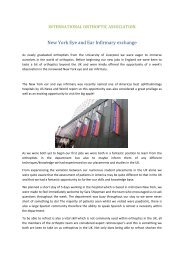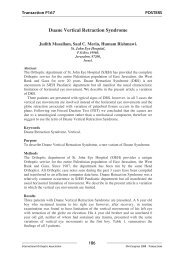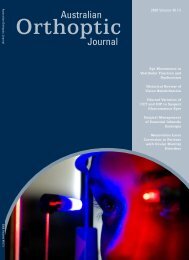Transactions from the Xth International Orthoptics Congress 2004
Transactions from the Xth International Orthoptics Congress 2004
Transactions from the Xth International Orthoptics Congress 2004
You also want an ePaper? Increase the reach of your titles
YUMPU automatically turns print PDFs into web optimized ePapers that Google loves.
Abstract<br />
Disruption of Binocular Vision following Cataract Surgery.<br />
Joy White<br />
Orthoptic Department, Sussex Eye Hospital, Eastern Road, Brighton BN2 5BF,UK<br />
joy.white@bsuh.nhs.uk<br />
The aim of this study was to assess <strong>the</strong> incidence of disruption of binocular vision following<br />
cataract surgery and to re-evaluate <strong>the</strong> role of Orthoptists in pre-assessment clinics for<br />
cataract surgery.<br />
A retrospective study was carried out of all patients who attended <strong>the</strong> hospital for cataract<br />
surgery between January 2003 and December 2003. The incidence of ocular motility disorders<br />
and diplopia which had been recorded in <strong>the</strong> case notes was noted pre-operatively, two<br />
weeks post operatively and if it was still persisting more than six weeks post operatively. All<br />
patients with persistent diplopia/symptoms related to disruption of binocular vision had been<br />
referred for Orthoptic assessment.<br />
In <strong>the</strong> period <strong>from</strong> January-December 2003 2147 patients had cataract surgery, 93% of whom<br />
had surgery under local anaes<strong>the</strong>sia. There was a total of 17 (0.8%) cases with persistent<br />
disruption of binocular vision post cataract surgery. The aetiology of <strong>the</strong> binocular problems<br />
was divided into three groups 1) refractive, 2) pre-existing deviation and 3) induced deviation.<br />
Treatment was by means of prisms, refractive correction, occlusion, Botulinum toxin and<br />
surgery.<br />
The incidence of disruption of binocular vision in those patients undergoing cataract surgery is<br />
not high. However <strong>the</strong> symptoms that <strong>the</strong>y have can be very difficult for <strong>the</strong> Orthoptist to<br />
eliminate despite a range of treatment modalities. The Orthoptist <strong>the</strong>refore has an important<br />
role in pre-assessment cataract surgery clinics in highlighting those patients in which <strong>the</strong>re are<br />
potential binocular complications.<br />
Keywords<br />
Cataract, diplopia<br />
Introduction<br />
The incidence of binocular complications has been well documented. The aim of this paper<br />
was to assess <strong>the</strong> incidence of <strong>the</strong>se complications and to re-evaluate <strong>the</strong> role of Orthoptists in<br />
pre-assessment clinics for cataract surgery. Orthoptists in <strong>the</strong> UK have an increasing role in<br />
cataract clinics, carrying out ophthalmic assessments to include biometry both pre-op and<br />
post-operatively. The same patients seen in <strong>the</strong> Cataract clinics may <strong>the</strong>n attend <strong>the</strong><br />
Orthoptic clinics with binocular complications.<br />
Methods


